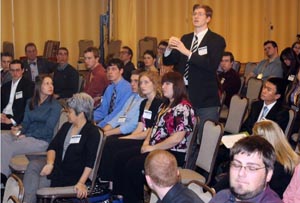2015 PEERS Offers New Tutorials for Career Development

The
2015 PEERS Conference, October 25-28 in Atlanta, Ga., USA, features new tutorials for career development.
These tutorials are designed for young professionals and anyone looking to enhance their career in the mill. Each session can be a launching pad for anyone changing their role in the mill. Attendees will also have the chance to meet others in the same career situation they are in, and develop their professional network.
Chip Quality Management Tutorial (Career Development)
What chip quality do pulp mills really want (and what do they really need)?
Chips are more than 1/2 the variable cost of making pulp and often all that is tested is moisture content to be sure they don't pay chip suppliers too much. This workshop will focus on the high return possible from taking representative chip samples, doing tests that provide reliable data, maintenance and process changes that make economic sense, and how suppliers can be motivated to deliver the best chips they can make.
Consistency Control / Sensor Tutorial (Career Development)
"Consistency - The Foundation of Papermaking"
Consistency control is the foundation of pulp manufacturing and the papermaking process. Without it, it’s difficult to optimize the rest of the process. This presentation will review the fundamentals of consistency control and measurement. The following questions will be addressed: What are the benefits of good consistency control? How do we know if our consistency program is where it should be? What are the differences between various consistency technologies? How do we justify and implement a sound consistency program? How do we ensure that the benefits of a sound consistency control program are recognized year after year?
Stack Testing Tutorial (Career Development)
Emission testing is one of the most challenging environmental measurement disciplines. A successful emission test program requires a solid understanding of test program objectives and the right combination of test methodology, expertise, process operations, and regulatory agency coordination. Because there are any variables and potential sources of error, many emission testing programs are not properly completed are completed at significant and often unanticipated expense. The good news is that the challenges associated with emission testing can be effectively managed with proper program design, planning, coordination, and implementation.
This hour introductory level workshop provides information that will help mill personnel design, manage, and evaluate emission testing programs. The content is applicable to compliance, in-house engineering, and performance guarantee test programs. The principles and practices outlined in this workshop will help mill personnel achieve their emission testing objectives while controlling program costs and schedule.
TAPPI
http://www.tappi.org/
 The 2015 PEERS Conference, October 25-28 in Atlanta, Ga., USA, features new tutorials for career development.
The 2015 PEERS Conference, October 25-28 in Atlanta, Ga., USA, features new tutorials for career development. The 2015 PEERS Conference, October 25-28 in Atlanta, Ga., USA, features new tutorials for career development.
The 2015 PEERS Conference, October 25-28 in Atlanta, Ga., USA, features new tutorials for career development.